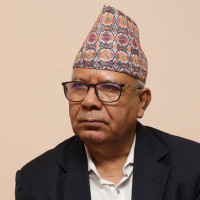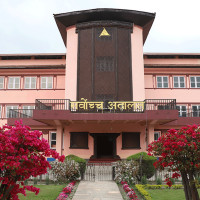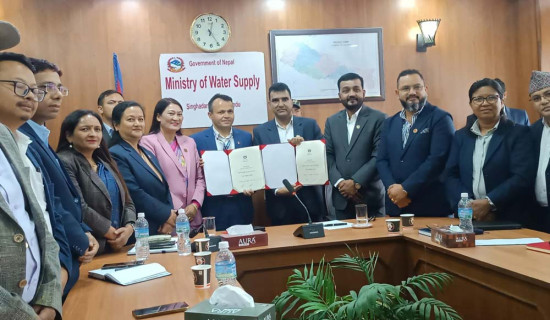- Friday, 9 May 2025
Reflections on constitution's achievements, challenges
By Pallav Bhusal,Kathmandu, Sept. 18: As Nepal prepares to mark the 9th anniversary of its constitution on September 19, reflections from prominent political leaders and constitutional experts shed light on the progress achieved and the challenges that remain. The 2015 constitution, a landmark in Nepal’s democratic evolution, aimed to establish a federal democratic republic with greater inclusivity, decentralisation, and fundamental rights for all citizens. However, nearly a decade into its implementation, questions about its effectiveness and the fulfilment of its promises persist.
The transition to a federal system was one of the constitution's most significant changes, intended to decentralise power and provide more autonomy to provincial and local governments. Radheshyam Adhikari, a constitutional expert and Constituent Assembly member, offered a critical assessment of this vision. He stated, “When we designed the federal system, the idea was to decentralise power and give more autonomy to provincial and local governments. However, in practice, we are still seeing the central government exert significant control over provincial affairs. This has hindered the true potential of federalism.”
Adhikari highlighted that the federal structure, which was meant to empower provincial governments to make independent decisions, often falls short due to central government intervention. “The federal structure has created opportunities for local leaders to represent their constituencies better, but their effectiveness is undermined when the central government overrides their authority. True federalism will only be realised when provincial governments have the autonomy to govern without interference,” he added.
Despite these challenges, the 2015 constitution has made notable strides in securing fundamental rights and promoting inclusivity. It guarantees a broad range of rights, including equality, freedom of expression, and protection against discrimination. The constitution also introduced measures to ensure representation for marginalised groups, such as women, Dalits, indigenous communities, and other minorities.
Purnaman Shakya, a constitutional expert, acknowledged the constitution’s progressive stance. “The Constitution of Nepal is one of the most progressive in the region, especially when it comes to ensuring inclusivity. It includes provisions for gender equality, social justice, and proportional representation for historically marginalised groups,” he said. However, Shakya pointed out that while these provisions are commendable on paper, their implementation remains a challenge. “The challenge lies in the implementation. On paper, we have made significant strides, but in reality, many of these provisions are not being enforced effectively,” he added.
Shakya stressed the need for stronger local-level governance to bridge the gap between constitutional guarantees and practical outcomes. “While the constitution guarantees rights for all, marginalised communities often face barriers in accessing these rights. Local governments need to play a bigger role in ensuring that these constitutional rights are not just theoretical but are applied in practice,” he remarked.
The constitution’s impact on political stability is also a major concern. Agni Kharel, former law minister and senior leader of the CPN-UML, underscored the complexities introduced by the federal system. “Political stability has always been a challenge in Nepal, and the federal system, while well-intended, has added a layer of complexity to our political landscape,” he said. Kharel noted that frequent changes in provincial coalitions have hampered effective governance and stability.
“Provincial governments have been plagued by frequent changes in coalitions, which makes it difficult for them to function smoothly. This has been one of the biggest hurdles in implementing federalism effectively,” he added.
Kharel emphasised that political unity and cooperation among parties are crucial for the federal system to succeed. “We need greater cooperation among political parties, particularly at the provincial level.
If coalitions keep shifting, governance becomes unstable, and the people suffer. The federal system was meant to bring government closer to the people, but when provincial governments are unstable, that goal becomes harder to achieve,” he said.
As discussions continue, the consensus among experts is that the constitution may require amendments and new laws to address current shortcomings and enhance its effectiveness. Kharel advocated for these changes to strengthen governance and the federal system. “The constitution of Nepal has made significant strides in granting rights and promoting inclusivity. However, to ensure a stable government and a robust federal system, certain amendments are necessary. We need to introduce new laws and regulations that can be integrated into the existing constitutional framework without disrupting its core principles,” he stated.
Khim Lal Devkota, a federalism expert and former National Assembly member, echoed the call for reform. “The federal structure has great potential, but we need to ensure that provincial governments are given more autonomy, particularly in terms of financial independence. Right now, provincial governments are too dependent on the centre for funding and decision-making. This undermines the spirit of federalism,” Devkota said. He advocated for greater financial autonomy for provincial governments to enable effective governance. “If provincial governments don’t have control over their finances, they can’t govern effectively. The central government needs to trust provincial governments with more resources and allow them to make decisions that are best for their regions,” he added.
Binda Pandey, a CPN-UML leader and advocate for women’s rights, highlighted both progress and ongoing challenges in ensuring representation and empowerment for marginalised groups. “We have certainly made progress. The constitution has ensured that all people from different backgrounds are represented at all levels of government, which is a significant achievement. However, representation is only the first step,” Pandey said. She emphasised that women and other marginalised groups need more than representation; they need real influence and decision-making power. “We need to focus on empowering everyone beyond just ensuring their presence in government. This includes providing them with the necessary education, resources, and opportunities to lead,” she added.
As Nepal celebrates the 9th anniversary of its constitution, the reflections of these leaders and experts underscore both the achievements and the challenges of its implementation. The constitution has laid a solid foundation for a federal, inclusive democracy, but much work remains to be done. Strengthening the federal system, ensuring the rights of marginalised groups, and addressing political instability at the provincial level are crucial to fulfilling the promises of the 2015 constitution.
The consensus among these political leaders and experts is clear: Nepal’s constitution is a progressive document with immense potential, but its success will depend on how well it is implemented.
The coming years will be critical in determining whether the federal system can deliver on its promises and whether inclusivity and representation can be fully realised for all citizens. As the country reflects on the progress made over the past nine years, the focus will be on bridging the gap between theory and practice, ensuring that the constitution’s promises are not just words on paper but a reality for all Nepali.

















